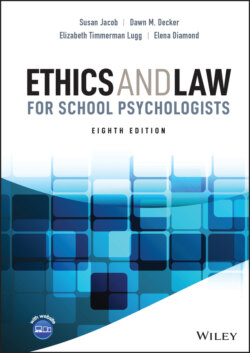Читать книгу Ethics and Law for School Psychologists - Susan Jacob - Страница 41
Responsibility to Schools, Families, Communities, the Profession, and Society
Оглавление“Psychology functions as a discipline within the context of human society. Psychologists, both in their work and as private citizens, have responsibilities to the societies in which they live or work and to the welfare of all human beings in those societies” (CPA, 2017, p. 31; also APA Principle B; Prilleltensky, 1991; Shriberg & Moy, 2014). Consistent with these ideas, the NASP’s fourth broad theme states: “School psychologists promote healthy school, family, and community environments. They assume a proactive role in identifying social injustices that affect children and youth and schools and strive to reform systems-level patterns of injustice.” They “maintain the public trust by respecting law and encouraging ethical conduct. School psychologists advance professional excellence by mentoring less experienced practitioners and contributing to the school psychology knowledge base” (NASP Broad Theme IV).
Under the fourth broad theme of responsibility to schools, families, communities, the profession, and society, the NASP’s code of ethics has specific standards for promoting healthy school, family, and community environments (Guiding Principle IV.1 and subsumed standards); respecting law and the relationship of law and ethics (Guiding Principle IV.2 and subsumed standards); maintaining public trust by self-monitoring and peer monitoring (Guiding Principle IV.3 and subsumed standards); contributing to the profession by mentoring, teaching, and supervision (Guiding Principle IV.4 and subsumed standards); and contributing to the school psychology knowledge base (Guiding Principle IV.5 and subsumed standards).
Read and consider Case 1.4.
